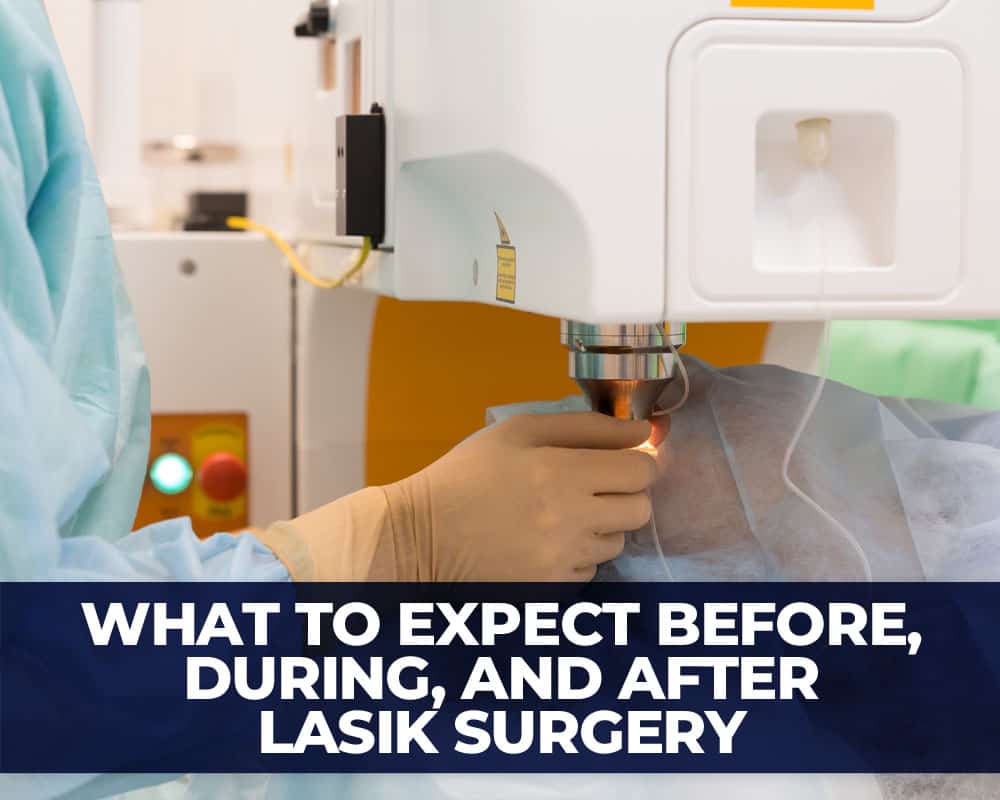Home » Blog » What to Expect Before, During, and After LASIK Eye Surgery
What to Expect Before, During, and After LASIK Eye Surgery
Posted by: Center for Sight in Uncategorized, November 26, 2018

LASIK eye surgery is a very specific type of refractive surgery that uses a laser to treat common eye conditions like myopia, hyperopia, astigmatism and more. During this process, a medical professional will use a cutting tool to literally reshape your eye’s cornea – allowing light to enter the eye in a way that it can be properly focused onto the retina, allowing you to finally enjoy the clear vision you’ve always wanted.
Knowing what to expect before, during and after your LASIK eye surgery is of critical importance, as not only is it the best way to help minimize certain degrees of risk that you may experience, but it will also help you maximize the results that you can expect for years to come.
Before LASIK Eye Surgery
Prior to LASIK eye surgery, your doctor will actually perform a series of tests to confirm whether or not you’re a viable candidate for the procedure. The brunt of this will involve taking measurements of your eye and cornea to determine how much tissue must be removed.
Prior to this, it’s important to stop wearing your contact lenses and switch over to a regular pair of glasses. Contact lenses can make subtle changes to the shape of your eye over the course of several weeks, which can cause the doctor to take inaccurate measurements during this initial round of testing. For the best results, stop wearing soft contact lenses about two weeks prior to your evaluation and stop wearing hard contact lenses for about four weeks prior.
During this time, you should also be totally honest and open with your doctor about your medical history. They need to know all about your past and current medical and eye conditions; they need a list of all the medications you’re taking and things that you’re allergic to, etc.
One day before LASIK, you should also stop using creams and lotions and definitely stop wearing any makeup or perfumes that you’ve grown accustomed to.
During LASIK Eye Surgery
On the day of your surgery, you will be prepped by your doctor for a relatively short period of time, and the entire experience should last around 30 minutes or less. You’ll be placed in a reclining chair in an exam room, and the primary piece of equipment that your doctor will use is actually a very sophisticated type of laser system featuring a microscope, a computer screen, and other materials.
After placing a numbing drop in your eye, the doctor will clean the eye and get to work. They’ll use various pieces of equipment like a mechanical microkeratome, a laser keratome or others (depending on the situation) to cut the flap of your cornea.
The surgery itself is not painful, but you may experience some slight discomfort, and you will likely experience a degree of blurred vision throughout.
After LASIK Eye Surgery
In the immediate aftermath of the procedure, you may experience a burning or even itching sensation in your eye. Don’t worry – this is normal. You may also be more prone to watery or teary eyes than you have been in the past. Whatever you do, don’t rub your eye. Likewise, you’re probably going to experience a degree of light sensitivity after the procedure. This, too, is normal.
You’ll likely be asked to book a follow-up appointment with your doctor between 24 and 48 hours after the surgery. You’ll also want to see your doctor regularly for the first six months at intervals that they recommend.
Unless your doctor tells you something to the contrary, do not use creams or lotions for a full two weeks after your surgery. You’ll also want to avoid swimming, using hot tubs or being present in other wet environments for at least two months. All of this will help significantly curb your risk of side effects after the surgery.
It’s important to note that it can take a full six months for your vision to totally stabilize after LASIK eye surgery. Certain visual symptoms – like a general difficulty with driving at night – will be common during this time. Your doctor will prescribe you some type of eye drop to aid your body’s natural healing process (though the specific prescription will obviously vary depending on the medical professional you’re working with).
The major benefit that you will see after LASIK, obviously, is one of greatly improved vision. Any problems that you were experiencing before that made you an ideal candidate for LASIK in the first place will likely be greatly reduced, if not eliminated entirely. You may still need to wear eyeglasses in certain situations after LASIK, but this too is nothing to worry about. It’s also important to note that these effects are not necessarily permanent – LASIK isn’t a “cure” for presbyopia or other conditions that set in as we get older.
